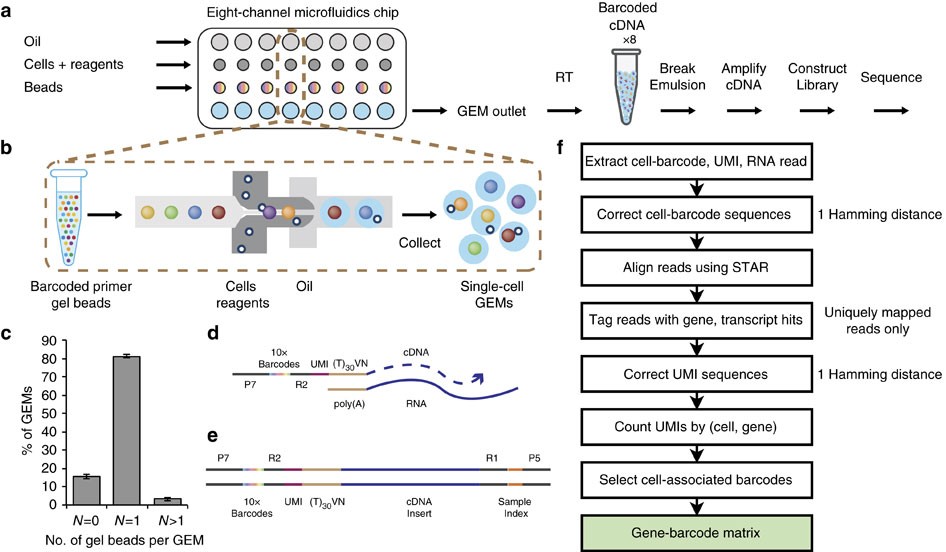doi.org/10.1038/ncomms14049
Preview meta tags from the doi.org website.
Linked Hostnames
42- 188 links todoi.org
- 34 links toscholar.google.com
- 33 links toscholar.google.co.uk
- 33 links towww.ncbi.nlm.nih.gov
- 22 links towww.nature.com
- 7 links towww.springernature.com
- 5 links toadsabs.harvard.edu
- 5 links tostatic-content.springer.com
Thumbnail

Search Engine Appearance
Massively parallel digital transcriptional profiling of single cells - Nature Communications
Characterizing the transcriptome of individual cells is fundamental to understanding complex biological systems. We describe a droplet-based system that enables 3′ mRNA counting of tens of thousands of single cells per sample. Cell encapsulation, of up to 8 samples at a time, takes place in ∼6 min, with ∼50% cell capture efficiency. To demonstrate the system’s technical performance, we collected transcriptome data from ∼250k single cells across 29 samples. We validated the sensitivity of the system and its ability to detect rare populations using cell lines and synthetic RNAs. We profiled 68k peripheral blood mononuclear cells to demonstrate the system’s ability to characterize large immune populations. Finally, we used sequence variation in the transcriptome data to determine host and donor chimerism at single-cell resolution from bone marrow mononuclear cells isolated from transplant patients. Single-cell gene expression analysis is challenging. This work describes a new droplet-based single cell RNA-seq platform capable of processing tens of thousands of cells across 8 independent samples in minutes, and demonstrates cellular subtypes and host–donor chimerism in transplant patients.
Bing
Massively parallel digital transcriptional profiling of single cells - Nature Communications
Characterizing the transcriptome of individual cells is fundamental to understanding complex biological systems. We describe a droplet-based system that enables 3′ mRNA counting of tens of thousands of single cells per sample. Cell encapsulation, of up to 8 samples at a time, takes place in ∼6 min, with ∼50% cell capture efficiency. To demonstrate the system’s technical performance, we collected transcriptome data from ∼250k single cells across 29 samples. We validated the sensitivity of the system and its ability to detect rare populations using cell lines and synthetic RNAs. We profiled 68k peripheral blood mononuclear cells to demonstrate the system’s ability to characterize large immune populations. Finally, we used sequence variation in the transcriptome data to determine host and donor chimerism at single-cell resolution from bone marrow mononuclear cells isolated from transplant patients. Single-cell gene expression analysis is challenging. This work describes a new droplet-based single cell RNA-seq platform capable of processing tens of thousands of cells across 8 independent samples in minutes, and demonstrates cellular subtypes and host–donor chimerism in transplant patients.
DuckDuckGo
Massively parallel digital transcriptional profiling of single cells - Nature Communications
Characterizing the transcriptome of individual cells is fundamental to understanding complex biological systems. We describe a droplet-based system that enables 3′ mRNA counting of tens of thousands of single cells per sample. Cell encapsulation, of up to 8 samples at a time, takes place in ∼6 min, with ∼50% cell capture efficiency. To demonstrate the system’s technical performance, we collected transcriptome data from ∼250k single cells across 29 samples. We validated the sensitivity of the system and its ability to detect rare populations using cell lines and synthetic RNAs. We profiled 68k peripheral blood mononuclear cells to demonstrate the system’s ability to characterize large immune populations. Finally, we used sequence variation in the transcriptome data to determine host and donor chimerism at single-cell resolution from bone marrow mononuclear cells isolated from transplant patients. Single-cell gene expression analysis is challenging. This work describes a new droplet-based single cell RNA-seq platform capable of processing tens of thousands of cells across 8 independent samples in minutes, and demonstrates cellular subtypes and host–donor chimerism in transplant patients.
General Meta Tags
209- titleMassively parallel digital transcriptional profiling of single cells | Nature Communications
- titleClose banner
- titleClose banner
- X-UA-CompatibleIE=edge
- applicable-devicepc,mobile
Open Graph Meta Tags
6- og:urlhttps://www.nature.com/articles/ncomms14049
- og:typearticle
- og:site_nameNature
- og:titleMassively parallel digital transcriptional profiling of single cells - Nature Communications
- og:descriptionSingle-cell gene expression analysis is challenging. This work describes a new droplet-based single cell RNA-seq platform capable of processing tens of thousands of cells across 8 independent samples in minutes, and demonstrates cellular subtypes and host–donor chimerism in transplant patients.
Twitter Meta Tags
6- twitter:site@NatureComms
- twitter:cardsummary_large_image
- twitter:image:altContent cover image
- twitter:titleMassively parallel digital transcriptional profiling of single cells
- twitter:descriptionNature Communications - Single-cell gene expression analysis is challenging. This work describes a new droplet-based single cell RNA-seq platform capable of processing tens of thousands of cells...
Item Prop Meta Tags
5- position1
- position2
- position3
- position4
- publisherSpringer Nature
Link Tags
15- alternatehttps://www.nature.com/ncomms.rss
- apple-touch-icon/static/images/favicons/nature/apple-touch-icon-f39cb19454.png
- canonicalhttps://www.nature.com/articles/ncomms14049
- icon/static/images/favicons/nature/favicon-48x48-b52890008c.png
- icon/static/images/favicons/nature/favicon-32x32-3fe59ece92.png
Emails
2Links
368- http://adsabs.harvard.edu/cgi-bin/nph-data_query?link_type=ABSTRACT&bibcode=2013Natur.498..236S
- http://adsabs.harvard.edu/cgi-bin/nph-data_query?link_type=ABSTRACT&bibcode=2014Sci...343..776J
- http://adsabs.harvard.edu/cgi-bin/nph-data_query?link_type=ABSTRACT&bibcode=2014Sci...344.1396P
- http://adsabs.harvard.edu/cgi-bin/nph-data_query?link_type=ABSTRACT&bibcode=2016Sci...352..189T
- http://adsabs.harvard.edu/cgi-bin/nph-data_query?link_type=ABSTRACT&bibcode=2016Sci...352..474N